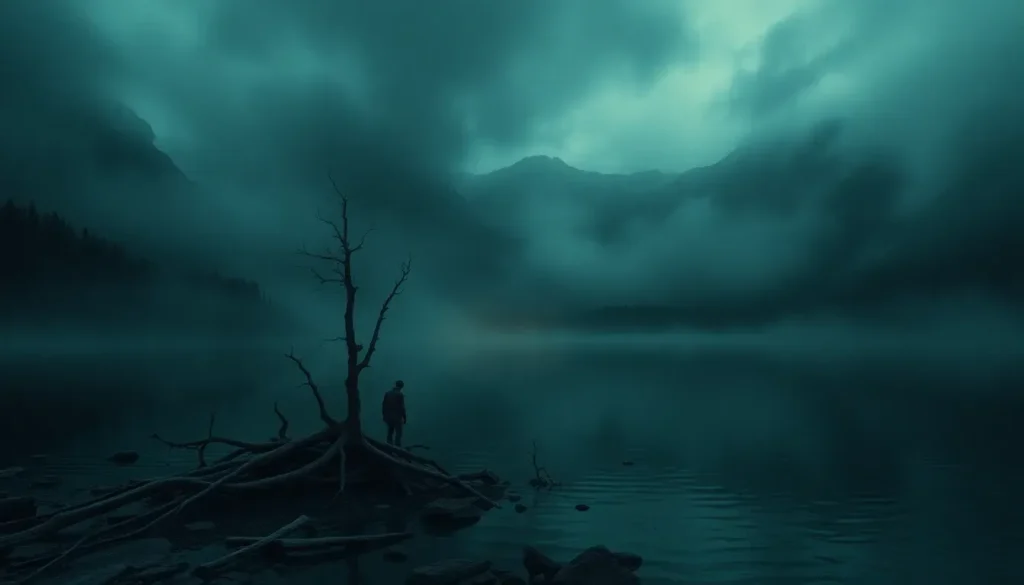What is 'Bone Lake', the surprising horror movie everyone is talking about

In Bone Lake, directed by Mercedes Bryce Morgan, everything that can go wrong does, often in the most unexpected ways. This film has garnered attention across North America for its unique blend of erotic thriller and horror, creating a rare cinematic experience that initially appears to parody both genres. The story begins with a familiar premise: a couple seeking rest and passion finds themselves entangled in a nightmare filled with unimaginable horrors. However, it quickly becomes clear that beneath this seemingly ordinary tale lies something far more intriguing.
The protagonists, Diego (Marco Pigossi) and Sage (Maddie Hasson), embark on a trip to a location that sounds as inviting as a graveyard with a spa. The film’s sinister charm lies in its irony; the title Bone Lake is chilling and devoid of any romantic allure. Nonetheless, the couple hopes to revive their floundering relationship in this eerie setting. Diego attempts to write an erotic novel, while Sage finds herself buried in work. Both are deceiving themselves about their true feelings.
Fate—or perhaps the algorithm of a rental app—has other plans, as another couple has booked the same house. Will (Alex Roe) and Cin (Andra Nechita) arrive with flawless smiles and an overwhelming sexual energy that seems to make the walls blush. What starts as an awkward comedy soon morphs into a twisted game of manipulation and paranoia, where no one dares to voice their true desires.
Everything Goes Wrong Quickly in ‘Bone Lake’
The director cleverly toys with the audience just as her characters tease each other. With a blend of patience, provocation, and an acerbic sense of humor that could corrode the screen, the film sets its tone from the very first scene—a naked couple fleeing from something we never fully see. The film establishes that sex and death share the same language. The script by Joshua Friedlander transforms the absurd into art, balancing visual pleasure with moral discomfort. It elevates Bone Lake from a simple commentary on desire and infidelity into a terrifying landscape.
As the two couples spy on, mimic, and confront each other, the lakeside house evolves into a battleground of domestic warfare and ritualistic paganism. Diego, frustrated by writer's block, finds himself drawn to the attention Will offers. Sage, tired of faking orgasms and smiles, begins to succumb to Cin's provocations, who glides through scenes like a designer poison. This sets the stage for a bloody disaster.
When Things Go Awry, They Go Awry in 'Bone Lake'
Before long, trivial conversations about writing and journalism devolve into confessions of infidelity, power struggles, and guilt. What could have been a simple Airbnb anecdote morphs into a brutal examination of contemporary desire. Everyone craves freedom, yet no one can bear the freedom of others. The plot of Bone Lake hinges on this cynical dilemma, thus transforming any hint of romance into something far more sinister and perverse.
- Confessions about infidelity emerge unexpectedly.
- The lines between desire and power blur significantly.
- Characters grapple with the repercussions of their suppressed feelings.
- The setting shifts from a vacation retreat to a psychological battleground.
Visually, the film is equally captivating, thanks to cinematographer Nick Matthews, who transforms the cabin into a hybrid of a futuristic brothel and a haunted house. The vibrant colors and artificial lighting do not aim for realism; instead, they evoke the sensation that the characters are trapped in a decaying erotic dream.
In one corner, erotic toys resemble archaeological relics; in another, a Ouija board is illuminated by candles, suggesting that desire is a spiritual invocation. Each room serves as an extension of the fractured minds of the protagonists. The grotesque and the comedic coexist seamlessly: a breakfast scene can morph into an orgy of glances, and a board game can culminate in a bloody dance. Dark humor emerges from the details; the editing mocks eroticism, dialogues flirt with absurdity, and the deaths—when they occur—are so choreographed they resemble private jokes shared between the director and the audience.
Sex, Chills, and Death
As Bone Lake reaches its climax, the accumulated tension erupts into a deadly explosion of aggression and cruelty. However, the violence is far from gratuitous. It serves as the logical culmination of repressed desires and a failure to communicate. The narrative unfolds like a sexual farce that decomposes into a tragedy steeped in gore. It artfully intertwines elements of love, narcissism, and raw survival instinct. Will and Cin represent the depraved reverse of Diego and Sage: they embody what the latter fear becoming and what they may have always been. Thus, Bone Lake does not focus on external monsters, but rather on the intimate monster that reveals itself when the masks fall away.
At its core, Bone Lake is not merely a tale of couples mutually destroying each other; it is a portrait of how desire and communication have become incompatible in modern times. Everyone believes they know what they want, yet no one can bear to truly listen to the other. The satire hides beneath moans and screams, making it clear that the real horror lies not in the violence, but in the silence that exists between two people who love each other but no longer understand one another. Morgan successfully crafts a film that is simultaneously entertaining, uncomfortable, and brutal, akin to a date that ends with blood in the wine. The result is a twisted hybrid: part nightmare, part failed sexual comedy, and completely addictive.
For further insights and explorations into horror cinema, check out this engaging video that delves deeper into the themes of Bone Lake:
With its unique take on the horror genre, Bone Lake not only entertains but also invites viewers to reflect on the complexities of human relationships and the often-unspoken tensions that can lie beneath the surface. It stands as a testament to the potential of horror as a medium for exploring deeper societal issues.




Leave a Reply